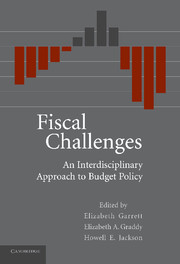Book contents
- Frontmatter
- Contents
- Preface
- Contributors
- PART ONE THE LAW AND POLITICS OF FISCAL POLICY
- PART TWO UNDERSTANDING FEDERAL DEFICITS AND PUBLIC DEBT
- PART THREE BUDGETING AND FISCAL CONSTRAINTS AT THE STATE LEVEL
- PART FOUR INTERGOVERNMENTAL ASPECTS OF BUDGET POLICY
- 11 Dysfunctional or Optimal Institutions? State Debt Limitations, the Structure of State and Local Governments, and the Finance of American Infrastructure
- 12 Federal–State Budgetary Interactions
- Part Four Bibliography
- PART FIVE JUDICIAL POWERS AND BUDGET POLICY
- Index
11 - Dysfunctional or Optimal Institutions? State Debt Limitations, the Structure of State and Local Governments, and the Finance of American Infrastructure
Published online by Cambridge University Press: 23 December 2009
- Frontmatter
- Contents
- Preface
- Contributors
- PART ONE THE LAW AND POLITICS OF FISCAL POLICY
- PART TWO UNDERSTANDING FEDERAL DEFICITS AND PUBLIC DEBT
- PART THREE BUDGETING AND FISCAL CONSTRAINTS AT THE STATE LEVEL
- PART FOUR INTERGOVERNMENTAL ASPECTS OF BUDGET POLICY
- 11 Dysfunctional or Optimal Institutions? State Debt Limitations, the Structure of State and Local Governments, and the Finance of American Infrastructure
- 12 Federal–State Budgetary Interactions
- Part Four Bibliography
- PART FIVE JUDICIAL POWERS AND BUDGET POLICY
- Index
Summary
INTRODUCTION
American state and local governmental fiscal institutions present a contrast. Many scholars regard these institutions as dysfunctional: balanced-budget provisions do not produce balanced budgets; debt restrictions do not restrict debt issue; tax and expenditure limitations limit neither taxes nor expenditures; and budget stabilization funds fail to provide budget stabilization. Richard Briffault, for example, concludes “state constitutional debt restrictions have been circumvented by new and creative financing devices that tend to drive up the cost of borrowing, encourage the fragmentation of state governments, and facilitate the evasion of balanced budget requirements.”
In contrast, American state and local governments are quite responsible by any reasonable measure of fiscal probity. They borrow large amounts of funds and rarely fail to service or repay their debts. The vast majority of state and local debt is issued to finance infrastructure investments, and American infrastructure is in many respects the best in the world. The decentralized structure of American government, while far from perfect, often is held up as a system of how to constrain the powers of government through the institutional mechanism of federalism.
We resolve the apparent contradiction of these two views by looking deeper into the effect of fiscal rules on the structure of American governments. The structure of American state and local governments has changed frequently, if episodically, since 1776. We argue that scholars have failed to appreciate the degree to which fiscal issues have shaped the structure of American state and local government.
- Type
- Chapter
- Information
- Fiscal ChallengesAn Interdisciplinary Approach to Budget Policy, pp. 331 - 365Publisher: Cambridge University PressPrint publication year: 2008
- 9
- Cited by



